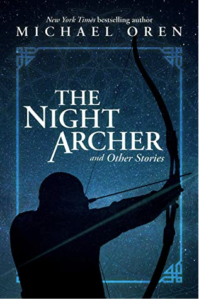Reading Michael Oren’s debut collection of short stories reminded me very much of being a teenager again and reading two of Roald Dahl’s short story collections for adults, Kiss Kiss and Switch Bitch, once I’d exhausted his works for younger readers. Densely packed with entertainment value, each book was a wild ride that I wouldn’t see the likes of again from a single author till Jeffrey Archer’s A Twist In The Tale. The Night Archer carries on in this tradition, deftly leaping genre boundaries to pull together a collection of stories whose primary shared trait is a surprising bend in the narrative. With fifty-one tales gathered together, there’s an abundance of reading material to be had here.
 And that’s part of this book’s problem. Had each story been a remarkable gem, polished to a sheen and set carefully amidst others that would only enhance its beauty, this would have been a treasury of truly remarkable writing. With some tight editing, excising more than one repetition of theme and perhaps narrowing the selection to a trim twenty-eight or so (the number I personally marked down as being either good or interesting, with a further thirteen that had real potential,) stories like Jorge and The World Of Antonia Flechette, both excellent pieces on the road not taken, would have stood out better. As it is, the really great stories tended to be interspersed with what seem like lesser clones, or writing warm ups almost. You could have split this volume in two and published the second after several years and the stories would have had a much stronger impact for not being jumbled up all together in one book.
And that’s part of this book’s problem. Had each story been a remarkable gem, polished to a sheen and set carefully amidst others that would only enhance its beauty, this would have been a treasury of truly remarkable writing. With some tight editing, excising more than one repetition of theme and perhaps narrowing the selection to a trim twenty-eight or so (the number I personally marked down as being either good or interesting, with a further thirteen that had real potential,) stories like Jorge and The World Of Antonia Flechette, both excellent pieces on the road not taken, would have stood out better. As it is, the really great stories tended to be interspersed with what seem like lesser clones, or writing warm ups almost. You could have split this volume in two and published the second after several years and the stories would have had a much stronger impact for not being jumbled up all together in one book.
Of the gems, I found that I tended to enjoy the longer works, particularly Aniksht, the story of 4+ generations of one Jewish family surviving the brutality of the 20th century, as well as An Agent Of Unit Forty, the unironic tale of a university professor whose big mouth and bigger ego get him into trouble. The Thirty-Year Rule was a brilliant skewering of American, British and Russian interests in the Middle East, yet I still felt whole-heartedly for the protagonist and for his desire to look up and one day be reunited with his beloved. Metaxis and Nuevo Mundo were both fine examples of historical colonial horror, while What’s A Parent To Do? and The Widow’s Hero both spoke to the very realistic concerns of aging in the modern world. Ruin and Liberation, the first two stories of the book, were moving variations on the specters that haunt us at the ends of lives unfulfilled. The Curio Cabinet, featuring a frustrated police detective, was in my opinion the most successful of the outright murder mysteries included.
Of the duds, it should surprise no one that I rolled my eyes at Slave To Power. While I won’t dispute the historical accuracy, I felt it somewhat telling that the only tale which blamed a religion for the cruelty of its adherents was this story of a pasha overseeing impalements. Weird how the Cossacks who figured so largely as villains in other tales didn’t have their Christianity tied so closely to their crimes against humanity. I was also thoroughly annoyed by The Betsybob, which started out quite well and movingly but devolved into a weird, unfunny joke, devoid of the pathos that marked many of the earlier stories in the volume. I’ll give The Blind Man the benefit of the doubt in hoping that the kids’ protests were at their mother’s incredibly horrible assumption regarding the title character’s mental state, but there’s no saving D, a truly awful short story narrated by the father of an autistic child. Not only does the narrator claim that Douglas “does not feel, not entirely” but he also longs for his kid to grace him “with a real son’s smile.” Worse than this devaluation of the humanity of an autistic person was the romanticization of his unnamed father, who was portrayed as the real victim here.
Yet this is all of a parcel with the Dahl and the Archer, products of mid- to late-20th-century literature that were popular if edgy for the time. Looking back on single-author collections like those with the benefit of decades of social progress, it’s fascinating to see where the subversive veers into the sublime or, lamentably, into sheer nescience. The best of The Night Archer falls squarely in the former, with stories that feel transcendent of time, yet too many more feel stuck still in the 1970s and 80s. I would love to see the timeline of when these stories were written, and honestly would have preferred that to the somewhat banal introduction reminding us that there is no freedom without form or limits, whether in writing or in life. True, but much less interesting than a thoughtful discussion of how the stories in this book specifically came to be.
